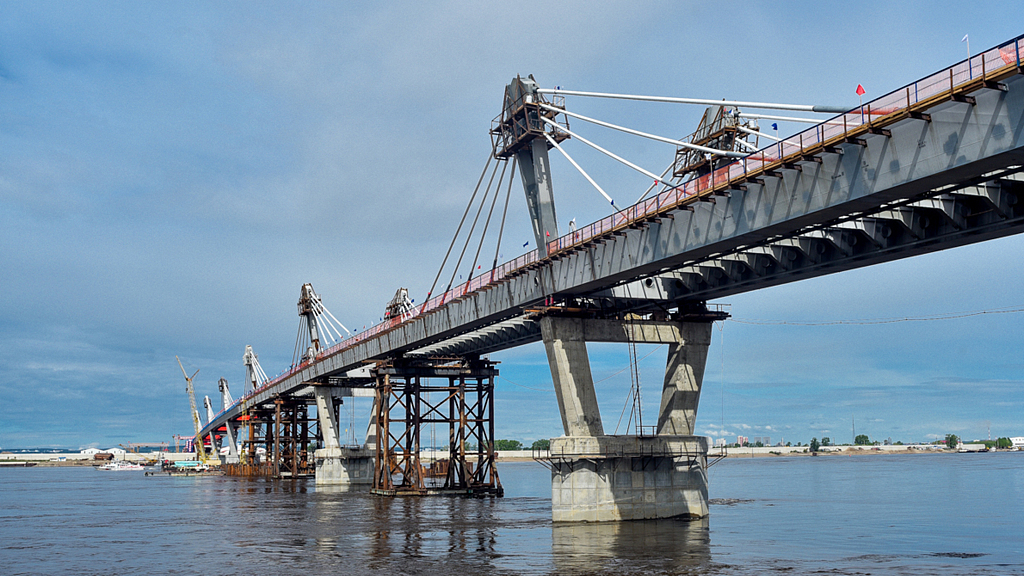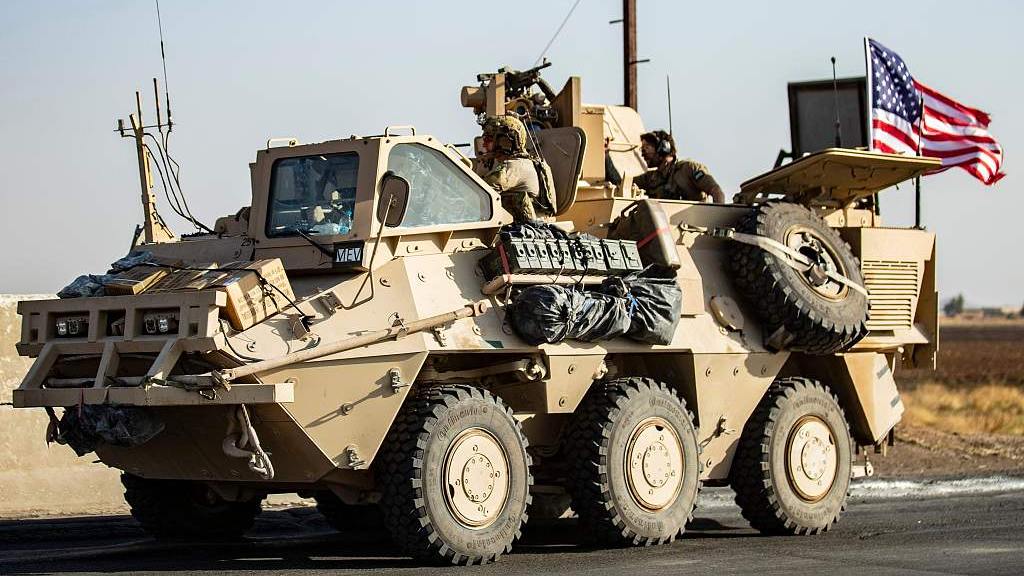
The first Sino-Russian cross-border highway bridge spanning over Heilongjiang River, between northeast China's Heilongjiang Province and Russia's Far East. /VCG
The first Sino-Russian cross-border highway bridge spanning over Heilongjiang River, between northeast China's Heilongjiang Province and Russia's Far East. /VCG
Editor's note: Danil Bochkov is an expert with the Russian International Affairs Council. He graduated cum laude with a master's degree in economics from MGIMO-University under the Ministry of Foreign Affairs of Russia and a master's degree in world economy from the University of International Business and Economics in China. The article reflects the author's opinions and not necessarily the views of CGTN.
China and Russia have just experienced a new downturn in their relations with the U.S. and its allies. Russia faced U.S.-EU coordinated sanctions over Alexei Navalny's case earlier the month, with a later extension to cover tighter export control measures.
On the same day, the Joe Biden administration prolonged for one year Ukraine-related economic sanctions. In a clear sign of deteriorating ties, U.S. Secretary of State Antony Blinken is now throwing "costs and consequences" warnings at Moscow for its activities against the United States as well as stressing the administration's firm opposition to the Russian Nord Stream 2 gas pipeline.
China has also come under U.S.-coordinated scolding for Beijing's proactive foreign policy, which Washington deems as a threat to its global leadership. Biden witnesses "stiff competition with China" and has pledged to prevent it from becoming the world's "leading," "most powerful" and "wealthiest" country.
The announcement came after China and the U.S. were at odds during the first high-level talks under the Biden administration, trading stern rebukes. The meeting was preceded by the first Quad states leaders' forum where all four vowed to coalescence against China's growing influence in the Indo-Pacific.
China-U.S. relations hit its new low, when Washington resorted to its Russia-tested "sanction cudgel" imposing restrictions on 24 Chinese officials over Hong Kong on March 17 with subsequent restrictions introduced later the month with reference to China's Xinjiang Uygur Autonomous Region.
Washington is forging a broader coalition of states including Canada, the EU and the UK in a move Biden described as an alliance of democracies. Russia and China along with "other autocratic states" were singled out by the U.S. administration as a "key challenge." After finishing the Asian tour with visits to the Republic of Korea (ROK), Japan and India, top U.S. officials turned an eye to Europe and NATO.

A U.S. military vehicle patrols a road near the town of Tal Baydar in Hasakeh province, northeast Syria, October 12, 2019. /VCG
A U.S. military vehicle patrols a road near the town of Tal Baydar in Hasakeh province, northeast Syria, October 12, 2019. /VCG
Blinken, at the NATO summit on March 25, stressed that Beijing's growing military ambitions and Russia's new military capabilities "challenge alliances and undermine rules-based order." NATO is also targeting China and Russia with its plans to forge "like-minded democracies" partnerships with Japan, the ROK and other Asia-Pacific states as a "bulwark against Beijing."
Moscow and Beijing seem to recognize deep-rooted antagonism with the U.S. and its allies – more painted by Washington as an ideological confrontation of democratic and non-democratic states. On March 22-23, the two countries showed their unified position on most pressing global issues, as well as shared concern over Western "illegal unilateral sanctions."
Chinese State Councilor and Foreign Minister Wang Yi, echoing his Russian counterpart, debunked the U.S. rhetoric referring to the so-called "rules-based international order" as lacking clear clarification and being unable to represent the international community.
East Asia is getting the attention of China and Russia, as signified by Russian Foreign Minister Sergey Lavrov's stop in the ROK following his rendezvous with Wang Yi. It all comes against the background of the U.S. increasing activities in the region following reassurance of contacts with Japan and ties galvanization with China's Taiwan, with which Washington sealed a coastguard deal – denounced by Beijing as "sending wrong signals to Taiwan independence forces."
Moscow and Beijing faced with U.S.-orchestrated maximum pressure campaign not only striven to reassure each other of mutual trust and went on checking and balancing the Asian vector, but also commissioned their foreign ministers to another crucial geostrategic region – the Middle East – to reinvigorate their regional partnerships.
The region has recently proved vital for the global economy following the blockage of the Suez Canal affecting 12 percent of global trade or $9 billion in daily losses. And Wang Yi and Lavrov's recent visits to the region can certify its importance to the two countries.
China pursues comprehensive policies in the region collaborating with many states acting even with regional archrivals such as Iran and Saudi Arabia. With the former, Beijing has inked a 25-year comprehensive agreement in trade, transportation and economics aimed at polishing an economic and diplomatic alliance with Tehran, which deems China "a friend for hard times" – a move that has already caused resentment in the U.S.
Although some U.S. experts think that China's and Russia's aspirations in the Middle East are rather a way to undercut American positions in the region, both Moscow and Beijing are demonstrating their shared postures on many regional issues. They prioritize a "two-state solution" in the Israeli-Palestine conflict, value the Iran nuclear deal, cooperate on the Syrian issue with the UN, coordinate on the Afghan peace process and together with Iran's call for peaceful resolution of the Yemen conflict through multilateral negotiation.
Such a widely shared spectrum of issues represents overlapping geostrategic calculations of Moscow and Beijing who are both facing mounting pressure from Washington-led coalitions.
(If you want to contribute and have specific expertise, please contact us at opinions@cgtn.com.)

